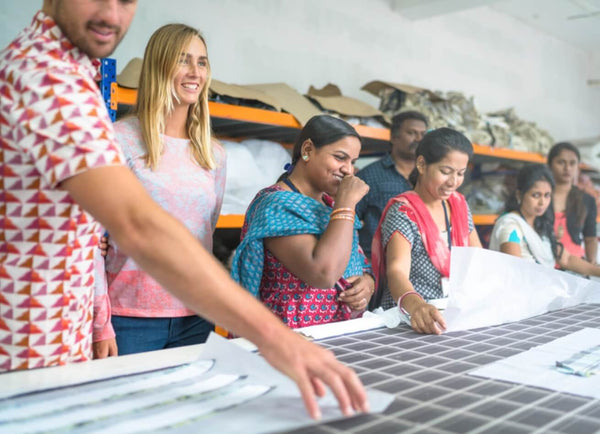Sustainability in the sportswear industry
Textile and clothing manufacturing has an intense environmental impact. Conventional clothes are usually manufactured from fields, sheep's back or oil well. While the process of turning raw materials into the usable fabric wastes huge amounts of water and utilizes harmful chemicals, unethical labor, and other non - conscious processing methods.
Apparel and footwear industries currently account for 8% of global greenhouse gas emissions, nearly as much as that of the whole European Union.
By 2030, the climate impact of the apparel industry alone is forecasted to almost match today's annual US greenhouse gas emissions, emitting an equivalent of 4.9 gigatonnes of carbon dioxide.
At Weekendbee we advocate sustainability and feature a wide range of ethically produced clothing. Read more about how we choose the sustainable brands we work with.
Choosing recycled polyester, local or organic cotton and water-saving fibers such as Tencel and hemp, has a lower environmental impact. It also sends a clear message to producers, that there is a high demand for eco-friendly products. In order to make a positive environmental impact, recycling, shifting to renewable energy, eco-friendly processing methods, smarter design, and efficient consumption methods are crucial.

Eco-Friendly Recycled materials
Clothes that are disposed of, as well as scrap fabrics, are typically burned. This has a disastrous effect on the environment, by producing a high percentage of carbon dioxide.
Not to mention, how wasteful it is…
This is why sustainable clothing brands commit to using eco-friendly recycled materials, such as recycled polyester or nylon. Additionally, after using your garments as long as they last, look for opportunities to recycle them.
Patagonia Rainshadow shell jacket is made from ECONYL® 100% recycled nylon. Fabric is also certified as bluesign® approved.
Each pair of Girlfriend Collective Compressive leggings starts with 25 recycled post-consumer water bottles. Did you know that almost all synthetic fabrics, like polyester and nylon, are made from plastic? (It’s true.) Girlfriend Collective makes theirs from materials that would otherwise clog landfills and threaten wildlife.
Organic Cotton - Saves Water Without Pesticides

Organic cotton farming does not use GM seeds, pesticides, or chemical fertilizers. The cotton is grown using methods that have a low environmental impact.
On the contrary, organic production systems replenish and maintain soil fertility, save water and build biologically diverse agriculture. An organic farm emits 94% fewer carbon emissions than a conventional one.
Did you know that using organic cotton in a T-shirt saves 102 liters of water compared to a conventional cotton T-shirt?
See all organic cotton sportswear at Weekendbee
Responsible Down - Best Practises in Animal Welfare
The Responsible Down Standard (RSD / TDS ) is an independent, voluntary global standard. It recognizes and rewards only the best practices in animal welfare. Down is traced from parent farm to apparel factory, to help ensure the strongest animal welfare and consumer assurance standards. These include robust requirements in all areas of the birds’ lives, and protects against force-feeding and live-plucking.
How to recognize a cruelty-free winter down jacket?
PFC Free - No Harm For The Environment

We all want to stay dry when it's raining cats and dogs but at what cost. PFC (perfluorocarbons) are chemicals that are used in technical garments to make them water repellent. PFC are chemicals that are released into the air when making and using a product and they are harmful to the environment and people.
The most dangerous C8 PFC chemicals have been recently banned in the EU but other types, like C4 and C6 chemicals, are still allowed even though there is no proper research of their health impact. Manufacturers don´t need to inform about these in product labels. Read more about PFC here.
You can trust the product being chemical-free only if the label states “Free from Perfluorocarbons” or PFC-Free.
The bluesign® system focus guarantees the application of sustainable ingredients in a clean process at which end stands a safely manufactured product. As a result, the textile industry manages the natural resources soundly and responsibly, reduces water and air emissions, improves its wastewater treatment and generally reduces its ecological footprint.
Fair Trade - Responsible manufacturing

Sustainability in fashion also includes socially responsible manufacturing and a commitment to creating a positive social impact on the surrounding communities and stakeholders. This also includes efforts to alleviate global poverty and financial grants to support health, education, and livelihood around the world.
At Weekendbee we ensure that the brands are transparent with their manufacturing and follow Fairtrade sustainable trade guidelines.
Care, repair, recycle - Make Your Clothes Last Longer
Clothing longevity is the key to sustainable fashion. Focusing on high-quality fabrics, while closely following clothing care guidelines, ensures a long life for your favorite garments. When making a new purchase it's important to choose a reputable, sustainable, high-quality brand and some classic, time tested designs. Lastly, instead of replacing a garment, we recommend repairing or repurposing it.







